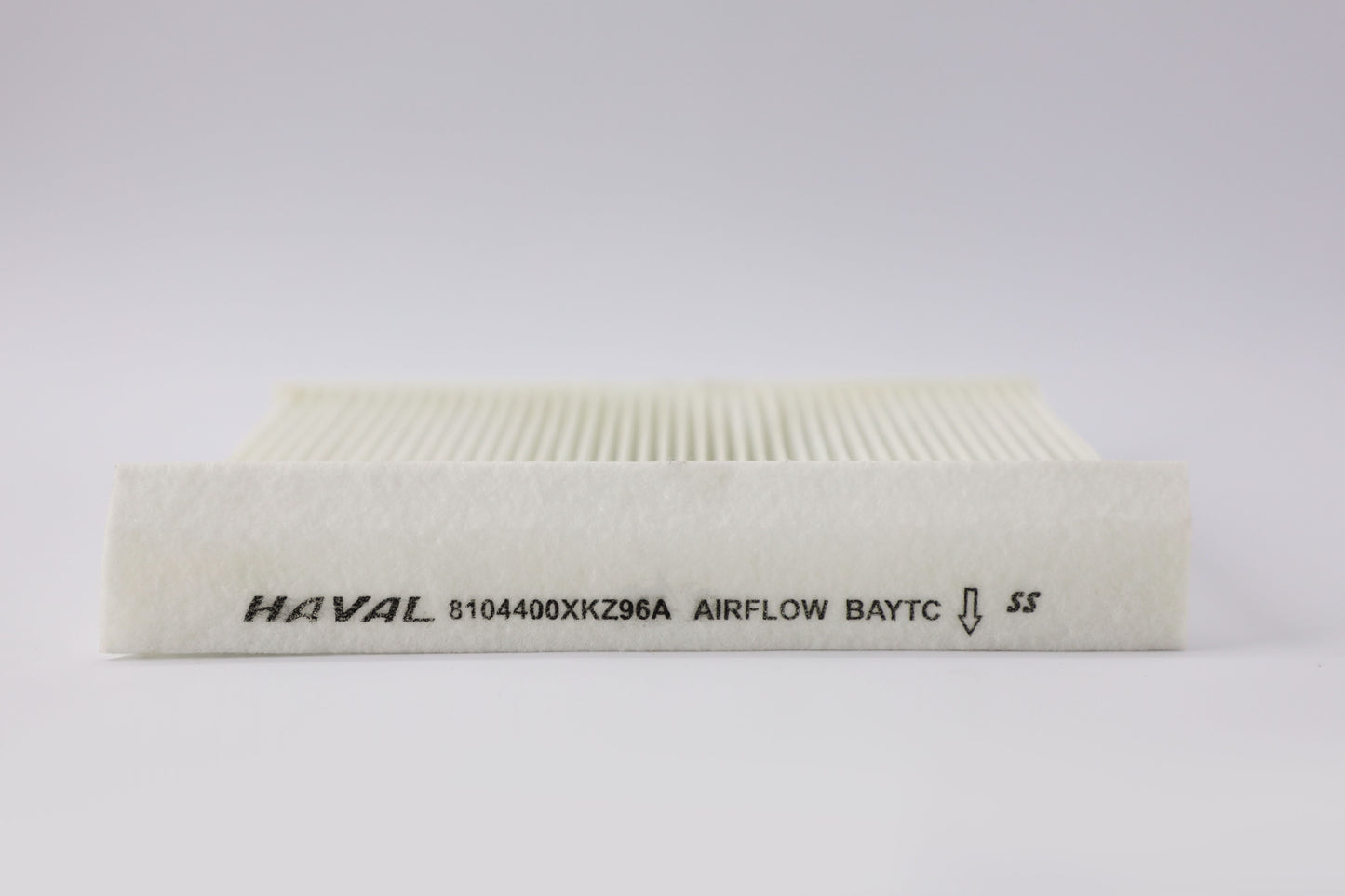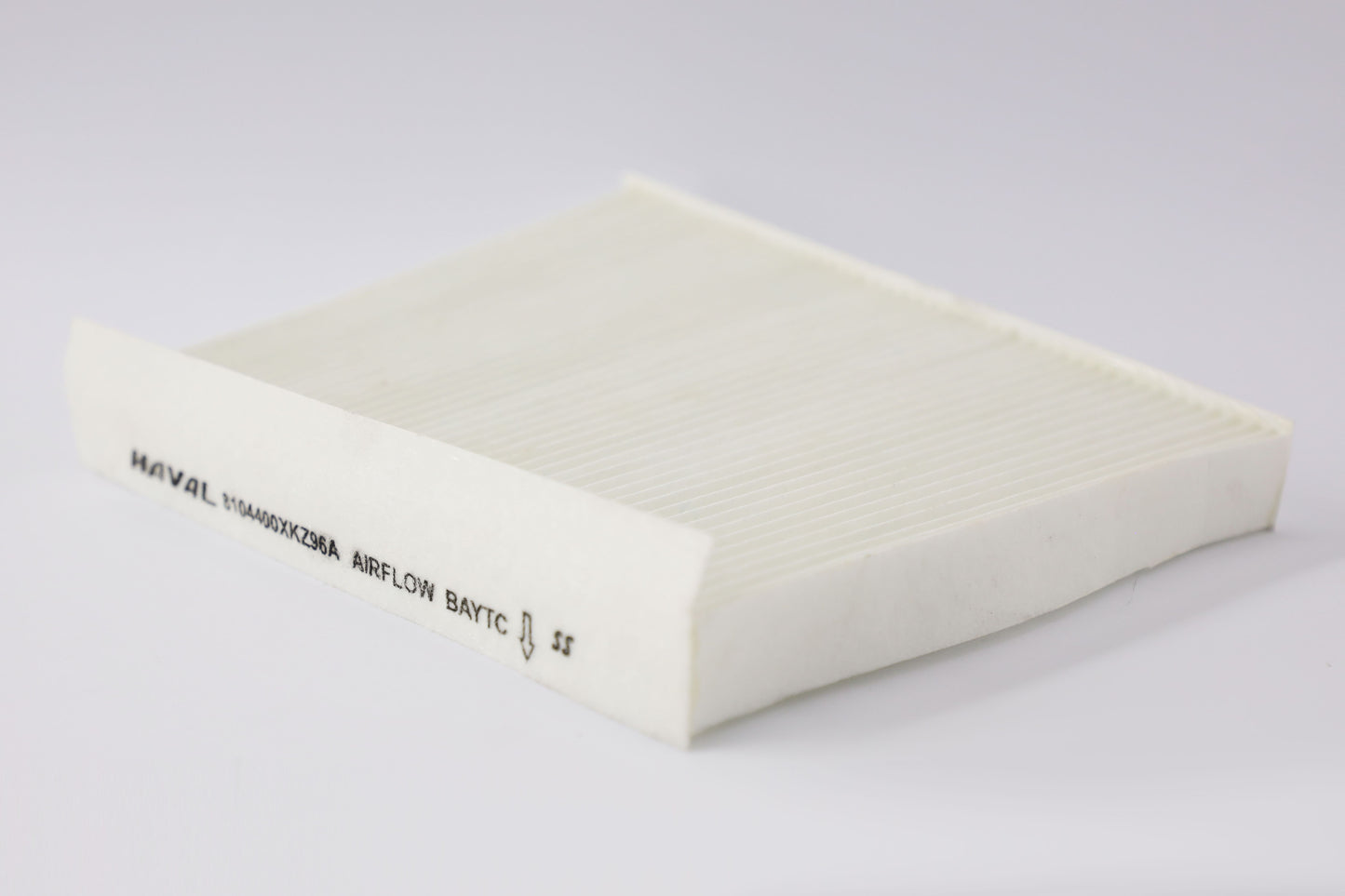My Store
AC CABIN FILTER HAVAL
AC CABIN FILTER HAVAL
Couldn't load pickup availability
The AC cabin filter in Haval vehicles is an important component that helps to maintain the air quality inside the cabin by filtering the air entering through the HVAC (Heating, Ventilation, and Air Conditioning) system. This filter plays a critical role in ensuring that the air circulating inside the vehicle is free from pollutants, dust, dirt, allergens, and unpleasant odors. Below is a detailed description of the AC cabin filter in Haval vehicles:
1. Purpose and Function
The AC cabin filter's primary function is to purify the air entering the cabin of the vehicle. The filter traps contaminants such as dust, dirt, pollen, and pollutants from the outside environment, preventing them from circulating inside the cabin and affecting the health and comfort of passengers.
- Primary Function: The filter ensures that only clean air enters the vehicle's interior, which is crucial for maintaining the air quality and overall comfort inside the cabin.
- Secondary Function: Many modern cabin filters come with an additional layer of activated carbon or charcoal, which absorbs odors and harmful gases like volatile organic compounds (VOCs), smoke, and exhaust fumes. This helps to neutralize any unpleasant smells and improve the freshness of the air inside the vehicle.
2. Benefits of the Cabin Filter
- Improved Air Quality: The AC cabin filter helps reduce the level of airborne pollutants inside the cabin. This is particularly beneficial for individuals with allergies, asthma, or other respiratory conditions, as it prevents allergens like pollen and dust from circulating within the cabin.
- Healthier Environment: By trapping harmful particles and allergens, the cabin filter reduces the risk of respiratory issues and discomfort caused by poor air quality, making the driving experience more comfortable.
- Odor Control: The activated carbon in some cabin filters helps to trap odors such as car exhaust, industrial pollutants, and other unpleasant smells, keeping the air inside the vehicle fresh and pleasant.
- HVAC System Efficiency: A clean cabin filter ensures that air can flow freely through the HVAC system. When the filter is clogged or dirty, it can reduce airflow, making the air conditioning or heating system less effective and requiring more energy to maintain the desired temperature.
3. Construction and Materials
- Filter Media: The cabin filter is typically made from materials such as non-woven fabric, synthetic fibers, or paper, designed to capture dust, dirt, and larger particles while still allowing air to flow through the system.
- Activated Carbon Layer: Some cabin filters are equipped with an activated carbon or charcoal layer, which helps to absorb odors and harmful gases. This is especially useful in urban areas with high levels of pollution or in situations where the vehicle is exposed to strong smells like smoke or industrial fumes.
- Electrostatic Properties: Some advanced cabin filters come with electrostatic properties that help to attract and trap finer particles, further enhancing the filtration capability and improving air quality.
4. Location of the AC Cabin Filter
In most Haval vehicles, the AC cabin filter is located behind the glove box or under the dashboard. The exact location may vary depending on the model year and the specific configuration of the vehicle, so it’s recommended to consult the vehicle's owner’s manual for detailed instructions on how to access the filter.
- Accessing the Filter: To replace the cabin filter, the glove box may need to be removed or a panel might need to be unscrewed. While this can be a simple task for some, if you're unfamiliar with the procedure, it's always a good idea to have a professional technician handle it.
5. Maintenance and Replacement
- Recommended Replacement Interval: The cabin filter in Haval vehicles should typically be replaced every 15,000 to 30,000 kilometers (or about once a year), depending on driving conditions and environmental factors. For vehicles driven in urban areas with high pollution or areas with a lot of dust, more frequent replacement may be necessary.
-
Signs That the Filter Needs Replacing:
- Reduced airflow from the HVAC system, especially noticeable when using the air conditioning or heating.
- Unpleasant or musty odors emanating from the air vents.
- Increased dust accumulation inside the cabin.
- Increased allergic reactions or respiratory discomfort due to poor air quality.
- DIY Replacement: Replacing the cabin filter is a relatively simple process, though the exact procedure can vary depending on the vehicle model. Typically, it involves removing the glove box or a panel to access the filter, removing the old filter, and installing a new one. Be sure to check the orientation of the filter during installation to ensure proper airflow direction.
6. Types of Cabin Filters Available for Haval Vehicles
- Standard Paper Filters: These filters are made from a pleated paper material and are designed to capture dust, pollen, and other large particles. They are commonly used in many vehicles, including Haval models, and provide basic air filtration.
- Activated Carbon Filters: These filters are enhanced with an additional layer of activated carbon or charcoal, which helps absorb odors and harmful gases, making them ideal for driving in areas with high levels of pollution or where odor control is a priority.
- High-Performance Filters: Some higher-end cabin filters offer superior filtration through advanced materials or design features, such as electrostatic properties, which help trap even smaller particles and improve overall air quality inside the cabin.
7. Impact of a Dirty or Clogged Cabin Filter
A dirty or clogged cabin filter can lead to several issues:
- Reduced Airflow: A clogged filter will restrict the airflow through the HVAC system, making it harder to maintain the desired cabin temperature. This could lead to poor air conditioning or heating performance and may cause the system to work harder, using more energy.
- Poor Air Quality: When the filter is clogged, it is less effective at trapping contaminants, allowing dust, allergens, and other particles to bypass the filter and enter the cabin. This can degrade the air quality inside the vehicle and cause discomfort or health issues for passengers.
- Increased HVAC System Wear: A dirty cabin filter can put additional strain on the HVAC system by forcing it to work harder to push air through the clogged filter. Over time, this could cause premature wear on the system’s components, such as the blower motor.
8. Conclusion
The AC cabin filter in Haval vehicles is an essential component for ensuring the comfort and health of passengers by maintaining clean air inside the cabin. By filtering out pollutants, allergens, and odors, it helps improve air quality and the overall driving experience. Regular inspection and replacement of the cabin filter will ensure the HVAC system operates efficiently and effectively, and that the cabin remains fresh and comfortable. Proper maintenance of the AC cabin filter is a simple but important task that can help improve vehicle performance, protect the HVAC system, and contribute to a healthier environment inside the vehicle.
Share




